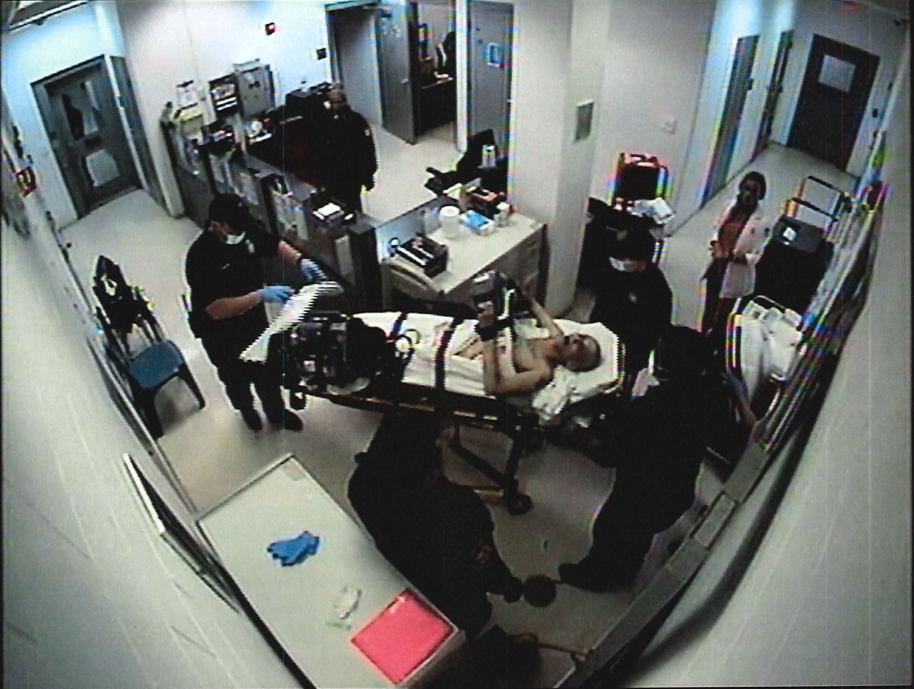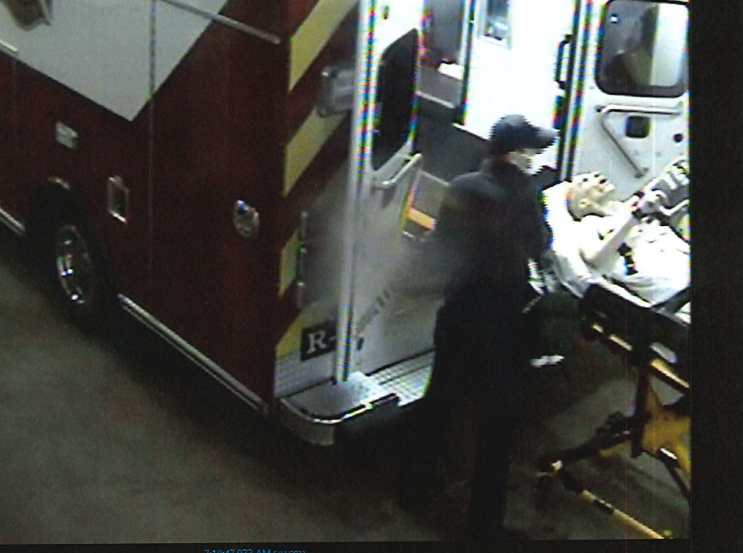Federal lawsuit filed against Richland County sheriff over woman's 2022 death in jail
From the beginning of Maggie Copeland's scheduled 15-day incarceration May 5, 2022, at the Richland County Jail, she was experiencing obvious signs of drug withdrawal, but a lawsuit filed in federal court Friday afternoon alleges her condition was met with "deliberate indifference" by those in charge who refused to provide necessary medical care even though she told them she was a heroin addict.
Six days later, Copeland, 29, of Mansfield, was found dead in a cell at the jail.
The timeline and details of Copeland's tragic death are outlined in the 23-page federal lawsuit filed Friday by Marion attorneys for Copeland's father, Jon Copeland, against Richland County Sheriff J. Steve Sheldon, Advanced Correctional Healthcare Inc. and numerous other defendants.
The lawsuit was filed in U.S. District Court, Northern District of Ohio, Eastern Division in Cleveland.

Lawsuit alleges jail staff failed to treat withdrawal symptoms
During the book-in process, a mental health referral was made but no assessment was done, the lawsuit asserts.
Those in charge are alleged to have failed to complete paperwork, and allegedly noted "medical intake refused" and "medical history unknown" while Copeland's medical history was not "unknown" and was on file with the jail from prior incarcerations, the lawsuit alleges, but jail personnel failed to retrieve her records.
Copeland continued to experience serious withdrawal symptoms including vomiting, defecating, acting out, yelling and an increased inability to care for herself, the lawsuit says.

Jail officials witnessed her strange actions and her serious medical condition yet failed to provide Copeland with the necessary and appropriate medical care, according to the lawsuit.
Copeland was found unresponsive at 7:08 a.m. May 11, 2022, lying naked with her hair cut off, with vomit coming out of her mouth in a cell at the Richland County Jail and was pronounced dead at 34 minutes later at OhioHealth Mansfield Hospital.
Jail officials' conduct caused Copeland's death, lawsuit claims
The lawsuit alleges that jail officials' conduct was the cause of the Mansfield woman's death.
Named as defendants in the lawsuit are the Richland County Board of Commissioners; Sheriff J. Steve Sheldon; Capt. Chris Blunk, the jail's administrator; Chuka D. Onyeneke M.D., jail medical director and jail physician; Advanced Correctional Healthcare Inc. of Franklin, Tennessee; four of the agency's licensed practical nurses, and unnamed sheriff's deputies.
Defendants Sheldon, Onyeneke, Blunk and Deputy Christy Dorsey were sued individually and in his or her official capacity.
"The loss of my daughter and the way it happened still has me reeling," Copeland's father, Jon Copeland, told the News Journal on Friday.
"The mental pain and anguish that I feel hasn't lessened over the past year. I haven't been able to really begin the healing process, and I don't think that I'll ever be the same. Maggie (Greta to me), wasn't just my daughter. She was a mother. Her sense of humor was infectious. She had a charisma about her that was undeniable. She was my buddy and my favorite thing about her was just talking with her," her father said in an email.
He said he is raising Copeland's son.
Jon Copeland said he brought the action as administrator of his daughter's estate to secure fair compensation and hopefully encourage defendants to provide appropriate treatment for future inmates suffering from drug and alcohol addiction, according to the lawsuit.
The suit claims that jail staff and nurses failed to provide adequate medical care and failed to treat Copeland for drug withdrawal. "Defendants' actions as described in this complaint were without probable cause, unjustified, objectively unreasonable and constitute deliberate indifference," the complaint says.
'Deliberate indifference' applied as legal standard
Courts apply the deliberate indifference standard to determine if a professional has violated an inmate's civil rights. Deliberate indifference occurs when a professional knows of and disregards an excessive risk to an inmate's health or safety, according to the U.S. Legal Forms website.
The complaint further alleges that Copeland was deprived of her rights, privileges and immunities secured by the Eighth and Fourteenth Amendments to the U.S. Constitution, including but not limited to the right to adequate medical care as a pretrial detainee and as a prisoner with a right to be free of cruel and unusual punishment.
"Maggie Copeland vomited for four and a half days, experienced a seizure, could not eat and displayed other obvious signs of medical distress before she died," the lawsuit alleges.
Copeland had been in a cell in the medical unit of the Richland County Jail, Sheriff Sheldon said in a news release after her death.
Marion attorneys say Copeland's civil rights were violated
"The civil rights violations committed against Maggie Copeland by the Richland County Jail and Advanced Correctional Healthcare tragically caused her death, which should enrage our society and her community," Rocky Ratliff, of Ratliff Law Offices in Marion, told the News Journal. He is representing Jon Copeland in the federal lawsuit.
Ratliff said Richland County should have done a better job of vetting Advances Correctional Healthcare, saying a Google search of ACH could have prevented Maggie's death.
"This Google search provides a laundry list of stories and cases that detail a history of lawsuits and civil rights violations related to the mistreatment and maltreatment of inmates under ACH care, including a 2016 'CBS Evening News' story outlining preventable inmate deaths. Our firm is not one full of computer experts, but our simple search located at least 30 instances of mistreatment by ACH, of which 23 result in inmates' deaths," Ratliff said.
The sheriff did not immediately provide a comment on the lawsuit.
Allegations detailed in the complaint
Copeland was arrested on Feb. 10, 2022, when a warrant was issued by the Mansfield Municipal Court for her failure to appear for probation. She was on probation for her conviction of possession of drug abuse instruments, a misdemeanor of the first degree, the lawsuit said.

After arriving at the jail to begin her 15-day sentence May 5, Copeland told two deputies and a nurse during her intake screening that she was a heroin addict who "used approximately two grams of heroin daily and that she used two grams of heroin that morning and that she would experience withdrawals from heroin," according to the lawsuit.
Copeland was taken to a cell with two other inmates. On May 6, she was interviewed by nurse Madison Conrad Hogie, LPN, concerning her health and Hogie referred Copeland to mental health because of drugs, noting that she used heroin daily, the lawsuit said.
The lawsuit claims Copeland was seen by a licensed social worker, but no mental health exam took place and no treatment or plan was instituted.
Withdrawal protocol was started by jail personnel on May 8, she was prescribed medication by the doctor and she was moved to a medical cell "due to withdrawals," the lawsuit said.
On that same date, a urine test was conducted on Copeland and she tested positive for cocaine, morphine, amphetamine, methamphetamine and methadone. Jail records show Copeland was started on the "medication protocol for withdrawal" 12 hours before Dr. Chuka D. Onyeneke was notified and placed the order, the lawsuit said.
Withdrawal symptoms worsen
The civil suit said a nurse noted on May 9 that Copeland continued to scream randomly, hit the cell door, throw food through the food flap when staff opened it, and that protocol medications were taken with difficulty. On May 10, her physical and mental health continued to worsen, the lawsuit states.
Copeland's hair was very long, below her waist, and was a source of pride for her, the lawsuit said. Consequently Copeland would never knowingly or willingly ask someone to shave her head.
On May 8, Copeland had been diagnosed with lice, the lawsuit says. At 11:55 p.m. May 10, while she was in a medical cell in complete drug withdrawal, nurse Hogie claimed that Copeland requested to have her hair cut off, according to the suit.
The nurse cut all of Copeland's hair off, and cleaned her and her cell because she was vomiting. Copeland was then left unattended. The nurses were supposed to check on Copeland at least every hour. But from the time the nurse cut Copeland's hair at 11:55 p.m. May 10 until Copeland was found unresponsive at 7:08 the next morning, nurse Hogie only went into Copeland's cell once, at 4:36 a.m. May 11, for about 10 seconds, the lawsuit states.
The nurse filed a false report that she checked on Copeland every hour after midnight when truthfully, the nurse checked on her only once, at 4:36 a.m., the suit says.
Maggie Copeland is observed not breathing
At 7:07 a.m. May 11, a corrections officer was collecting food trays from Copeland's medical cell and noticed Copeland had not eaten anything from the food tray. The officer could see Copeland was covered with a blanket, naked, with vomit coming from her mouth and the officer could not see her breathing, the lawsuit said.
The corrections officer called a nurse who checked Copeland's pulse and could not get a pulse and an emergency squad was called. CPR was started but Copeland was unresponsive. The squad left the jail at 7:21 a.m. and Copeland was pronounced dead 21 minutes later at the hospital.
The lawsuit alleges the defendants, in order to cover up their misconduct, jointly agreed and/or conspired with one another to prepare and file false, misleading, inaccurate and incomplete official reports and give false, incomplete and misleading versions of events to their superiors and the public.
Copeland was never personally examined by or assessed by Onyeneke or any other physician at the jail during the time she was in the jail suffering from drug withdrawal, the suit states.
Copeland's cause of death was listed as dehydration with renal failure, according to her autopsy from the Montgomery County Medical Examiner's Office. The death is contributed to by drug abuse, the report says. Copeland's autopsy said she had contusions of the left upper and lower extremities and abrasions of the knees, left leg, right hand and right wrist, per the autopsy report, which the News Journal obtained via a public records request.
The plaintiff is demanding a jury trial and requests that the court grant relief including award of damages to plaintiff against all the defendants, jointly and severally; award punitive damages against all defendants, award attorney fees, and award further relief as the court deems appropriate.
Father says he was 'making headway' with Copeland
"She made sense even though her world was tortured from childhood. I was making headway with her before her death. She was a drug addict and I loved her dearly. She'd lost her mother in December of 2021 and her partner in January of 2022. She was heartbroken. I got to spend the last two months with her, helping her to detox before she was arrested in Mansfield," Copeland said in an email.
"I'd asked her to get her jail time out of the way and then rehab. Her goal was to get clean and get back into her son's life. She told me, 'Dad, I don't mind doing jail time, but I wish it could be anywhere but Richland County. It's really that bad in there.' I thought she would be safe once she was there. I was so very wrong and I'll wear the guilt of asking her to go back to Mansfield for the rest of my life. My grandson and I are both struggling in dealing with this loss. We are both in therapy and (Greta's son) is doing better. I'm not so good due to all of this."
lwhitmir@gannett.com
419-521-7223
Twitter: @LWhitmir
This article originally appeared on Mansfield News Journal: Federal lawsuit filed over 2022 jail death of Maggie J. Copeland, 29

